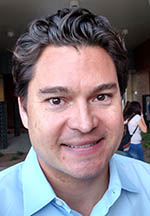By Rick Vacek
GCU News Bureau
Grand Canyon University students saw the sports marketing future Tuesday afternoon, and it is AJ Maestas.
It is a future that is predictable only in its unpredictability, measurable only in its mystery. It's also, if Maestas’ faster-than-a-speeding-bullet delivery is any indication, able to leap a tall thought in a single bound. The founder and president of Navigate Research insists he's just a numbers guy, but his ability to combine about 14 ideas into one sentence is equally super.
Maestas used almost half of his 1½-hour presentation schooling students on what it will take to break into the industry, emphasizing the importance of “directly relevant experience.” Asked afterward what he looks for in recent college graduates as they walk in the door, he was typically expansive:
“If you think about the rate of change in technology and consumer behavior changing so fast, we actually need someone with an unbelievable aptitude and a thirst for knowledge, the kind of person who loves new challenges and loves being challenged with new challenges because you can’t train for an unknown future, right? We basically try to home-grow them by identifying people who obviously have a technical skill that fits with what we need but also have a serious passion for knowledge and change.”
Maestas knows whereof he speaks. He made SportsBusiness Journal’s “Forty under 40” list this year, and in just nine years his Chicago-based company (he spends half the year at his office in Scottsdale) has become a big player that counts major professional sports leagues, college athletics departments, ESPN, NBC, Farmers Insurance and Southwest Airlines among its clients. Forbes named Navigate Marketing one of the 10 best organizations to work for in sports.
He peppered his audience with a long list of provocative predictions about what’s ahead, all grounded in research. For example:
- “The future of the media and advertising looks a lot more like sponsorships than traditional advertising. The 30-second TV ad is almost dead.”
- The future of television is toward hand-held devices and multi-channel networks, led by Microsoft, Apple and Google. “It will, under no terms, stay the way it used to be.”
- “Most of the exciting opportunities in our industry, no one has experience with — they’re all too new.”
For every bold statement, Maestas could back it up with facts. He zipped through reams of statistics about the state of the sports industry and emphasized repeatedly that you don’t know what you don’t know until you do in-depth surveys of your target audience.
“At its most basic function, research is — instead of trusting your intuition, which is often wrong, or your knowledge, which often is biased to your setting and often is out of date — letting you listen to your customers through their voice,” he said. “We teach people about the future or about today through the reality of what the marketplace wants versus what they think the marketplace wants.”
It was easy to see why Dr. Brian Smith, director of the Colangelo School of Sports Business, had to work for more than three years to get Maestas on campus and introduced him by saying to students, “This is why you come to GCU and study within our sports business program — for the opportunity to learn from and be encouraged by an exceptional real-world industry professional like AJ Maestas. This is a person, an entrepreneur, who is arguably the very best at what he does in the world. Navigate Marketing is the gold standard company for sports marketing research and analytics.”
The students benefited all the more from Maestas’ hard-edged advice about preparing for a career. He began with the simple admonition that people who work in sports have to be more than just fans, they have to treat the job like a job by merging their “avocation with vocation.” But knowledge is power, and in Maestas’ world the thirst for knowledge should never be satiated. He frequently interjected “Have you read (fill in the blank)?” into his discourse.
“If you don’t have an understanding of how the media and television work,” he said, “you need to.”
Maestas warned students that “there is a surplus of labor in sports because it’s cool” and noted that his company does a minimum of 12 reference checks for each candidate — and not the references the job seeker submitted.
He also urged them to go on internships while they’re still in college. “If you don’t want to work for free after you graduate, do it now,” he said. “Everybody works for free at some point.”
One of the toughest tasks for graduates to grasp is how to go about the job search, and Maestas is all about the personal touch. He likes the idea of a handwritten note after an interview, and not just to say thank you — it could mention an article you liked or congratulations for something good that happened to the company. Not surprisingly, it takes research to get a job in research.
“You will have no career in sports unless you take networking seriously,” he said.
But there will be opportunities, Maestas said. The face of sports is changing, literally, by becoming more diverse and forward-thinking.
“We need a staff that reflects the future, not the past,” he said.
The future is now. The future is people like AJ Maestas. Great Scott, how things are changing.
Contact Rick Vacek at (602) 639-8203 or [email protected].










































































